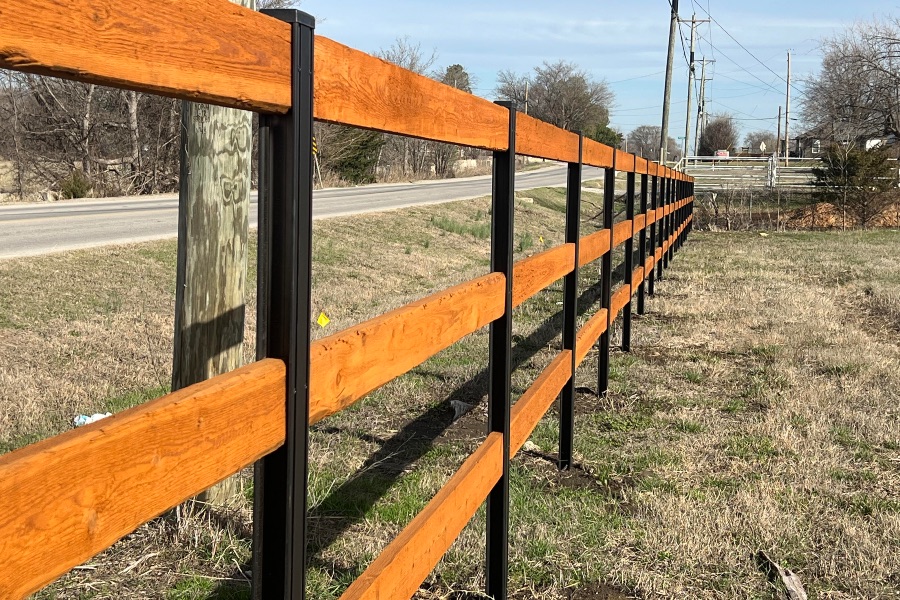All Categories
Featured

When mounting a fencing, picking the best product is crucial to balancing functionality, aesthetic appeals, and budget. Wood, vinyl, and aluminum are amongst the most commonly chosen fencing materials, each with its staminas and disadvantages. This guide discovers the advantages and disadvantages of these options to assist you make a notified choice.

Timber Fence. Pros:. All-natural Elegance: Wood's timeless appeal can enhance any type of residential property with its cozy and classic appearance. Customizable: You can repaint, stain, or carve timber to fit your style choices. Budget friendly: Wood secure fencing is at first more budget-friendly compared to some various other products. Eco-friendly: As an eco-friendly resource, wood is biodegradable and typically taken into consideration environmentally friendly. Disadvantages:. Maintenance-Intensive: Routine securing, paint, or discoloration is called for to avoid damages from weather condition and pests. Prone to Decay: Without proper treatment, timber can rot, warp, or fracture over time. Much shorter Life-span: On average, wood fences last 10-15 years, relying on the kind of wood and upkeep. Wood is a terrific alternative for those who value aesthetics and agree to spend in normal upkeep to maintain its look and resilience.
Plastic Fencing. Pros:. Low Maintenance: Plastic needs very little treatment-- simply periodic cleansing with soap and water. Weather Resistant: It doesn't warp, rot, or surrender to insect damage, making it highly resilient in different environments. Long life: Vinyl fences can last 20-30 years with little to no fixings. Design Variety: Available in a vast array of styles, shades, and appearances, including wood-like appearances. Disadvantages:. Higher Initial Expense: Vinyl fencings are much more costly in advance contrasted to timber. Vulnerability to Cold: In extremely cold climate, plastic can become weak and prone to splitting. Minimal Repair Service Options: Matching substitute panels can be challenging if damage happens. Plastic secure fencing is perfect for house owners searching for a long-lasting, low-maintenance solution that uses modern-day versatility.

Light Weight Aluminum Secure Fencing. Pros:. Rust-Proof: Light weight aluminum stands up to corrosion, making it a superb option for humid or wet settings. Long lasting: In spite of being lightweight, light weight aluminum is solid and can stand up to rough climate condition. Reduced Maintenance: It needs very little maintenance, generally only occasional cleaning. Long Life expectancy: Light weight aluminum fences can last decades without considerable degeneration. Classy Layout: Usually utilized for decorative functions, light weight aluminum secure fencing includes a sleek, innovative seek to buildings. Cons:. High Initial Investment: Light weight aluminum fences are amongst the pricier options on the marketplace. Less Privacy: The open designs typical with light weight aluminum fence do not give much privacy. Vulnerable to Damage: While long lasting, aluminum can damage if hit with adequate force. Light weight aluminum is an outstanding choice for homeowners focusing on aesthetics and durability without needing much maintenance.
Making Your Decision. When deciding between light weight aluminum, timber, or plastic fencing, consider your concerns:
Wood fits those who appreciate an all-natural look and do not mind placing in maintenance effort. Plastic is the very best alternative for those seeking a low-maintenance, weather-resistant remedy. Aluminum uses streamlined style and durable longevity yet may lack privacy. By carefully evaluating these materials' features, you can choose a fencing that complements your property while satisfying your visual and functional requirements.
Latest Posts
Learn How to Cut Costs on Car Maintenance with Montclare Auto Repair’s Special Deals
Published May 30, 25
1 min read
Uncover Cut Costs on Car Maintenance with Montclare Auto Repair’s Exclusive Deals
Published May 27, 25
1 min read
Discover WyHy FCU – Top Benefits for Your Future
Published May 24, 25
1 min read
More
Latest Posts
Learn How to Cut Costs on Car Maintenance with Montclare Auto Repair’s Special Deals
Published May 30, 25
1 min read
Uncover Cut Costs on Car Maintenance with Montclare Auto Repair’s Exclusive Deals
Published May 27, 25
1 min read
Discover WyHy FCU – Top Benefits for Your Future
Published May 24, 25
1 min read